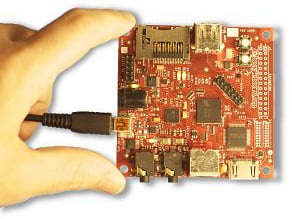Original URL: https://www.theregister.com/2010/06/25/riscos_beagleboard/
RISC OS runs on fastest hardware ever
Nostalgic for the Acorn Archimedes? Help is at hand
Posted in Personal Tech, 25th June 2010 09:02 GMT
RISC OS is alive and well and running on the fastest hardware it's ever been on – and the kit only costs £120. But "kit" is the operative word...
Acorn may sadly be no more than a brand name attached to fairly generic netbooks now, but Acorn's products are thriving. The Acorn RISC Machine, later renamed the Advanced RISC Machine once VLSI and Apple got involved, is one of the greatest British technology successes ever. ARM is the world's most successful processor – ARM's partners had shipped over ten billion units by the start of 2008, dwarfing the x86 market.
But even today, the ARM chip's original OS is still chugging along. RISC OS is experiencing more development than it has in years. The "official" version from RISC OS Ltd, mainly sold as an upgrade for old Acorn machines, is going nowhere fast, but the other fork, Castle Technology's RISC OS 5, has been released under a shared-source licence agreement and has transformed into RISC OS Open.
RISC OS 5 was built specifically for the Castle's Iyonix computer, based on a 600MHz Intel XScale 80321. RISC OS Open Ltd, affectionately known as ROOL, are reworking it for other hardware, including the last Acorn model, the RiscPC – and a small ARM development platform called the Beagleboard.
There are several small, inexpensive development devices that get electronics wonks all excited, such as the Arduino, based on an Atmel AVR microcontroller. It's great for embedding into all sorts of devices, if that's your personal thing.

The 3" square Beagleboard
The Beagleboard is a little different. Mainly this is due to its specification: an 720MHz ARM CPU, along with a DSP and PowerVR graphics, plus 256MB of RAM, a USB port, an HDMI port and SD/MMC slot. In other words, a capable little self-contained PC.
Most Beagleboards run Linux – there's even a version of Ubuntu available for it – but it's quite low-spec for a desktop system. Ports of other ARM operating systems are in progress, too, including QNX and Symbian. 256MB of RAM is plenty for RISC OS, though, and it goes like stink on the device.
David Lane of SASAUG showed a Beagleboard running RISC OS at this month's meeting of ROUGOL in London. Although a keen Acorn fan, Lane is self-confessed non-techie. As he puts it: "There's one failsafe way to spot a geek: do they have a hub? Until I bought the Beagleboard, I didn't!" The first time he showed the board, he only got RISC OS running in the last 10 minutes of a two-hour demo. This time, not only did it work perfectly, but by the end he was able to get the machine on the Web via a USB Ethernet adaptor for the first time.
The ROOL port is incomplete and there are still a few gotchas. The display needs to be powered-on before the board, or it won't be detected, and the OS displays an error about a missing keyboard every boot. (It's fair enough – there's no Acorn keyboard port anywhere near the thing and never will be.) A FAT-formatted SD card holds the ROM image, but the card slot can't be accessed by RISC OS just yet, so it also needs an Acorn ADFS-formatted USB key as a boot drive. Which pretty much mandates that you have to have a working Acorn box (with USB) to hand – or a free emulator – to bootstrap the system.
But hardware-wise, you don't need much: a power supply, a couple of flash drives, a small SD card – the OS only takes 10MB – and USB keyboard, mouse and hub, plus an HDMI display or a convertor cable to hook the HDMI output into a D-SUB or DVI monitor.
The ambitious might want to fit it into a case, or wait for UK availability of the slightly faster and better-specced Beagleboard-xM.
And new RISC OS hardware has never been so cheap: the official price of the board in its home state of Texas is $149, which with trans-Atlantic markup converts to about £120 in the UK. You'll need some basic RISC OS-fu to get it up and running, but compared to the £1500 that the new Amiga will cost you, it's a bargain. ®